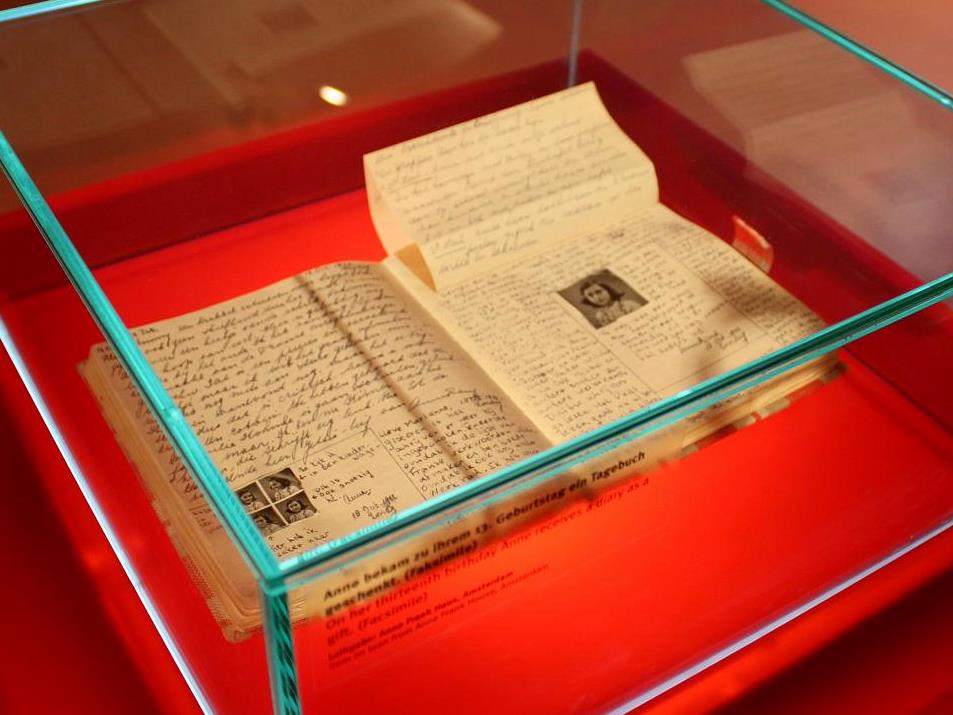Winner of the Fall 2018 StMU History Media Award for
Best Article in the Category of “World History”
Parents’ love for their children is unlike any other. It is something I think most of us often take for granted due to the fact that it is something we just cannot understand until we experience it ourselves. Our parents go to great lengths to ensure not only that we have everything we need, but that we are happy, safe, comfortable, and accomplished. The relationship between a father and his daughter, specifically, is one that in most cases is extremely strong and unlike any other. A father is the first boy in a girl’s life and he is there every step of the way. Fathers usually embody warmth and safety, and many even say that girls subconsciously look for significant others that remind them of their father. This case was no different for Otto Frank and his daughter Anne. She was always “daddy’s little girl.” Otto loved her, as well as the rest of his family, as deeply as anyone could ever ask of a father. He worked hard, always providing for them, and made every sacrifice necessary to keep his family from harm in such a terrifying time. Sometimes though, bad things happen to good people. When his family slipped through his fingers and his world shattered, Otto’s love never wavered. He took his grieving and turned it in to something beautiful. He was an outstanding father until the day he died, even if his fatherhood was slightly untraditional.

Anne Frank always wanted to be a writer, and her father was, of course, her biggest supporter. So, it was no surprise that for her thirteenth birthday, he gifted Anne a brand new, red-checkered journal that she would name “Kitty.”1 Anne grew up during a difficult time in our world: Nazi Germany. In 1933, when Hitler became Chancellor of Germany, the family, being Jewish, decided to relocate to Holland.2 For a while, life in Holland carried on as normal. But, in 1940, Anne’s sister Margot got a call from a Nazi soldier that scared the entire family.3 Since the Frank family was Jewish, they had to live out the war with great caution as well as in great fear. Almost immediately after the phone call from the soldier, Otto Frank, being the caretaker that he was, found an annex in his office building for his family to hide in, in attempts to avoid Nazi capture. Even in hiding, Anne continued to use her journal. In fact, in hiding is where she got the most use out of it. She wrote about everything that happened in the annex, from random events that occurred throughout the day to her own very personal thoughts. That diary displayed Anne in her truest form. Sadly, the life in the annex that they had become accustomed to came to a screeching halt. On August 4, 1944, Otto’s worst nightmare had come true; after over two years in the annex, the entire Frank family was captured by the Nazis, split up, and sent to various concentration camps.4 Otto Frank was left feeling like he had failed. They did not know if they would ever see each other again, or even if they would make it out alive.
When the war ended, the Frank family was devastatingly reduced to one member: Otto Frank. When he heard the news that he would never see the rest of his family again, Otto was devastated. As time passed, the broken-hearted father finally found it in him to return to the annex, where he met with Miep Gies. Miep was one of the family friends who had helped ensure the Franks were well fed and surviving as best they could while in the annex. She presented Otto with his daughter’s diary, which she had carefully saved in the bottom drawer of her desk in hopes of the girl’s return.5 Before they had been captured, every night Anne had left her diary under the protection of her father and placed it by his bed in a briefcase. She asked him never to look into it, and Otto never dared go against his beloved daughter’s wishes. When the diary had come back into his possession, he was torn. Knowing Anne wanted nothing more than to be a published writer, Otto was faced with a difficult decision. Reading the diary meant going against her wishes. Leaving it untouched not only meant the loss of her legacy, but also the loss of any chance at making Anne’s dreams of becoming a writer come true.

Otto decided to read the diary. The notion of being able to fulfill his daughter’s dreams and ensure her legacy was enough to get him to break out of his comfort zone. He believed in his daughter and her writing skills and just knew he could make something of the diary. However, it seemed that reading the diary almost put him in more of a debacle. “It took me a very long time to read it,” Otto said, “and I must say I was very much surprised of what deep thoughts Anne had.”6 Not only was he not sure what he should do next with the book, but he was now unsure if he really knew who his daughter was. “Her seriousness, especially her self-criticism; it was quite a different Anne than I had known as my daughter.”7 The diary was personal, and at times even taboo. She wrote about going through puberty, her shortcomings as a person as well as her sins. She, however, tried to keep a light within her bleak words as she insisted on wanting to be happy despite what was going on in her life.8 The Franks shared the bunker with the Van Pels family. The Van Pels had a son, Peter, who was not too far from Anne’s age. Understandably, considering her age as well as enclosed living space, Anne developed feelings for Peter, which she, of course, documented in detail within her diary.9 Otto was still at war with himself. He was worried about what people might think of his family if they read the truths Anne spoke. Could he let the world see his daughter so vulnerably? Could he withstand the responses that would surely come out in publishing the diary? Was he making the decision about him, rather than Anne?
Selflessly, Otto put any personal feelings he had aside. He loved his daughter and missed her dearly. He wanted her dreams to come true even if she would not be there to see it. Out of love, he decided to go forth and publish the diary. Otto spent long hours typing up the diary and sent the first copy to his mother, and the next few to close family friends. As word of the diary got out, publishers got hungry and offered Otto many opportunities to make it into a professionally done book. When he finally took up the offers of one publisher, the first version of the diary was published. It was titled “Het Achterhuis,” or “Secret Annex,” and excluded almost 30% of her the writings from her diary.10 This decision was meant to keep some of her privacy, as well as the family’s privacy, protected. The director of the publishing company felt that Anne spoke “too freely” about her sexuality and pushed to get rid of several passages.11 Either way, it was out in the world to be read by the masses and Anne’s dream of becoming published had finally been fulfilled. It was bittersweet for Otto, seeing the amazing success his daughter had become, but not being able to see her.

As years went on, the diary was published in many different versions in many different languages all over the world. It has had one of the most profound and lasting impacts of any book in our culture. In seventy years, the book has been translated into over seventy languages, making it one of the most translated books in the world.12 Otto didn’t stop there. For him, Anne’s legacy reaching to the world meant everything to him. He worked tirelessly on new versions of the book. After its publication, it became critically acclaimed by many influential people, such as Nelson Mandela. On top of that, there have been numerous film adaptions of the book since. In 1963, Otto founded the Anne Frank Fond (a foundation) in memory of his beloved daughter. The foundation’s one job is to spread Anne Frank’s word. It holds all copyrights and works to keep her life on paper safe.13 He took the great devotion he had for Anne and fathered her legacy from the ground up. He found a way to be a father to Anne in the physical world despite the fact she had left it.
Otto Frank was a man overflowing with love and support for his family. He went above and beyond to provide for them and keep them under his protection for as long as he could. No words can even begin to explain the pain of losing a child, much less two, along with a wife, and all due to the same reason at the same time. Yet, Otto pushed through all that hurt and turned it in to something beautiful. He gave back to the world even when it had taken everything from him. He constantly relived the life of his daughter, despite how undoubtedly hard it was, in assurance that she would become everything she was meant to be and more. A father’s love is indescribable, and Otto Frank was the perfect embodiment of the great lengths it will go to please its children.
- Anne Frank Stichting, “The History of the Diary,” Anne Frank House, April 19, 2010, http://diary.annefrank.org/the-history-of-the-diary/. ↵
- Salem Press Biographical Encyclopedia, 2013, s.v., “Anne Frank,” by Nancy D. Kersell. ↵
- Encyclopedia of Women’s Autobiography, 2005, s.v. “The Diary of a Young Girl,” by Gary Kerley. ↵
- Francine Prose, Anne Frank: the book, the life, the afterlife (New York: Harper Perennial, 2010), 63. ↵
- Francine Prose, Anne Frank: the book, the life, the afterlife (New York: Harper Perennial, 2010), 71. ↵
- The Legacy of Anne Frank, The Eternal Light (1967, the Jewish Theological Seminary of America and NBC), television program. ↵
- The Legacy of Anne Frank, The Eternal Light (1967, the Jewish Theological Seminary of America and NBC), television program. ↵
- Encyclopedia of Women’s Autobiography, 2005, s.v., “The Diary of a Young Girl,” by Gary Kerley. ↵
- Funk & Wagnalls New World Encyclopedia, 2017, s.v. “Frank, Anne.” ↵
- Encyclopedia of Women’s Autobiography, 2005, s.v., “The Diary of a Young Girl,” by Gary Kerley. ↵
- Anne Frank Stichting, “The Story of Anne Frank: Anne Frank’s Diary Is Published,” Anne Frank House, April 19, 2010, http://web.annefrank.org/en/Anne-Frank/Publication-of-the-diary/Anne-Franks-diary-is-published/. ↵
- Anne Frank Stichting, “The History of the diary,” Anne Frank House, April 19, 2010, http://diary.annefrank.org/the-history-of-the-diary/. ↵
- “Work of the Anne Frank Fonds,” Anne Frank Fonds, http://www.annefrank.ch/work-and-purpose.html. ↵



133 comments
Aaron Sandoval
This article was well written and was very insightful into the internal conflict that Otton Frank endured when deciding whether or not he would read the diary in support of her wishes, or support her dreams of being a published writer. The author did a good job of covering the struggles of a father realizing he may never have truly known who his daughter was, and due to the events of the holocaust he would only ever know who she was through her writings.
Sara Guerrero
I didn’t think this article was going to be from the presepective of Anne’s father and I love how the author wrote this article it was definitely emotional. I think that Anne’s father hesitated to do anything with Anne’s diary becuase he was afraid of the unknown and there was so much that could have happened. Anne’s diary became a leagacy among other books and I did learn that it became the most translated book. It shows its popularity and in a way reflects people’s sympathy for the many Jews that died in the Holocaust. It reflects the love that Anne’s father had and he accomplished Anne’s dream of being a writer.
Samuel Vega
The article is very well written and it humanizes the pain from all the atrocities that the Germans inflicted on the Jewish people. Of course, I recall reading the Diary of Anne Frank sometime in middle school. I did not recall the story of the publication and how Anne’s father was so conflicted about publishing the book. The article definitely brought out the love that Otto had for his daughter and how he ensured her dream of being published was carried out after her death.
Andrea Degollado
This article was extremely well written and just an incredible article overall. Anne Frank is a historical figure and studying her in high school was just eye opening specially when we learned about her whole family. My heart goes to Otto it must have been awful to go through his daughters diary and ultimately publishing it must have been a very difficult decision for him.
Jose Chaman
The story of Anna Frank will always be a story that moves not only one, but millions of hearts. However, the story of his father’s deep decision to publish her memoirs is as moving as his daughter’s story. It must have been truly devastating to have lost almost all of his family, so the publication of his daughter’s diary represents, above all, an enormous respect for his memory and father’s infinite love.
Mauro Bustamante
It always made me sad when I learned about the story of Anne Frank and the Holocaust in general. The amount of times Otto had to read Anne Franks diary in order to publish it must have been really hard for him to read the pain and struggle she went through. Anne Frank was certainly a historical figure that would not have been revealed without the influence of Otto. If Otto had not published Anne’s diary, society would not have known about the Frank family’s story. This article was well written and very informative.
Nicole Ortiz
This was such an amazing and well-written article that had a lot of detail and information. It always made me sad when I learned about the story of Anne Frank and the Holocaust in general. I can’t imagine how difficult this time was not only for the Franks but for anyone else during this time. It was good though that Otto published Anne’s diary because if it hadn’t been published, we would have never known what it was really like during that time in history.
Victoria Muller
The strength of a father’s love for his family is always remarkable, Otto is no exception to this. Through his immense love for his family he was able to get through so many hardships and make his daughter’s dream come true. In everything he did he kept thinking of of her and if it were her wishes instead of his own. His story is truly touching. Through all of the challenges he faced even though he knew that she would never be able to see it he did it all for her and never gave up. He is an aspiring father who demonstrates how great a father’s love for his daughter is.
Jeremiah Durand
Studying Anne Frank previously and then diving into a new view point is very eye opening to say the least. Much of what I know from Anne Frank is from analysis of her writing but when we take a step back with this story we see another important figure to leaving the legacy of Anne Frank. Had it not been for Frank Otto’s courage to publish this diary we might never have truly understood the realities of living in such an oppressed life. I can’t imagine the battle Otto must have fought himself on when deciding whether to publish the diary or not.
Amanda Quiroz
I felt bad for Otto. It must’ve been scary being the sole survivor in his family. It shows through his decision to publish Anne’s diary. The fact that he published it shows how much he cared about Anne. Anne always wanted to become a published author and it shows how he supported her and his family. Poor Otto. No parent wants to see their children go before them.